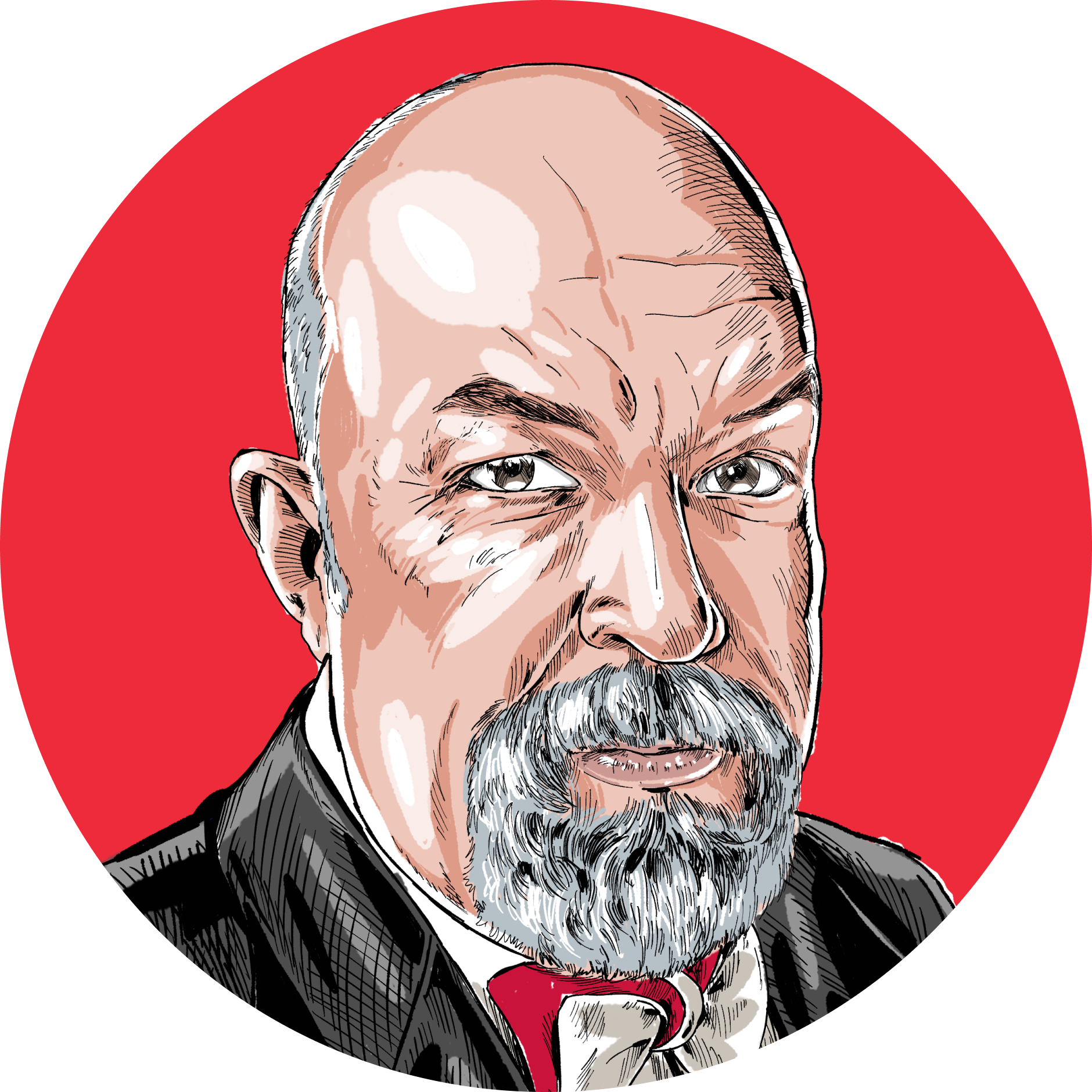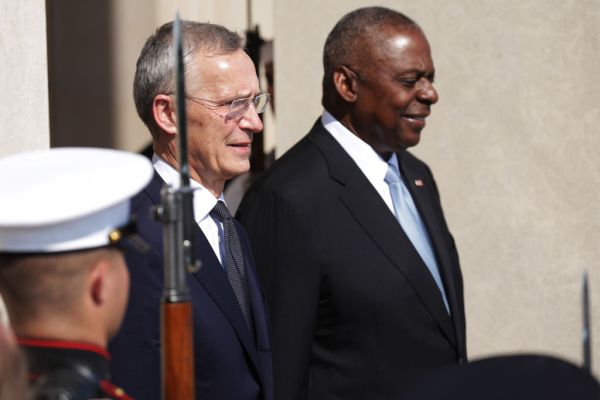My, but 2007 seems like a long time ago.
In 2007, Jay-Z made a video for “American Gangster” in which he prominently displayed a very large stack of banknotes—not the Benjamins that it used to be all about, but euros. And why not? The euro was, back then, at an all-time high against the U.S. dollar. Things went well for the eurozone for a while: In 2008, the European Union’s economy was larger than that of the United States. But growth changes everything, and the European Union has paid a high price for eurosclerosis: By 2022, the U.S. economy was 25 percent larger than the combined economies of the European Union and the United Kingdom, formerly the EU’s second-largest national economy. The U.S. economy is about 50 percent larger than the economy of the post-Brexit European Union. In 2008, a U.S. dollar would get you only 0.63 euros; in September 2022, the dollar bought you 1.03 euros, though as of Friday the greenback was only at 0.92 euros—not a record high, but almost half-again as much as it traded at in 2008. The United States is today much wealthier than the European Union on a per capita basis, with a gross domestic product per capita nearly 50 percent higher (on purchasing-power parity basis) than in the European Union. The only EU countries with higher per-capita GDPs than the United States are Ireland and Luxembourg, relatively small countries where the data are distorted by corporate profit-shifting. (Two European countries that are not EU members also have higher per-capita GDPs: Norway and Switzerland.) So, sing another chorus of “All About the Benjamins.”
But is that actually good for the United States?
Not at all, says the European Council on Foreign Relations, a think tank that provides invaluable resources for non-specialists looking to keep up with European affairs. Just a few days before President Emmanuel Macron of France warned about Europe becoming a “vassal” of the United States, the ECFR issued a report with a cheeky title—“The Art of Vassalisation”—and a sobering subtitle: “How Russia’s war on Ukraine has transformed transatlantic relations.” All that growth has been good for the United States, as has the continued development of U.S. military capabilities, even if many analysts argue that the United States has fallen grievously behind in its defense investments. (Fred Kagan is one of these; listen to his conversation with The Dispatch’s Jonah Goldberg here.) The Europeans have spent years talking about “strategic autonomy”—meaning the development of EU capabilities in such a way as to give the European Union the ability to see to its interests without U.S. support and, if necessary, in the face of U.S. opposition—but the European Union has grown less powerful relative to the United States during all those years of “strategic autonomy” talk rather than growing into more of an equal.
It is a very nice thing to grow more powerful relative to one’s enemies and rivals. Growing more powerful relative to one’s allies is, in its way, a kind of burden. The allied response to the Russian invasion of Ukraine has been, in effect, Washington’s response: As ECFR reports, the United States has provided more aid to Ukraine—military and humanitarian—than all of the EU countries combined. The number of U.S. troops stationed in Europe increased by nearly 50 percent in only a few months, and the Biden administration has rolled out plans for new bases and installations in the places that most need support: the Baltics, Romania, and Poland. This has gone along with a reversion to—even a deepening of—Cold War habits, with the United States both providing the bulk of funds and matériel and taking the lead strategically and politically.
This isn’t just about dollars and bullets. It is about political and intellectual leadership, too. From the ECFR report:
American leadership is about more than just resources. The US has proven necessary to organise and unify the Western response to the Russian invasion. Within the EU, there had been enormous divisions on the question of Russia in recent years. Countries such as Poland, Sweden, and the Baltic states deeply distrust EU members such as France, Germany, and Italy on the issue.
[German Chancellor Olaf] Scholz and Macron believed until the very eve of the invasion that a compromise with Russia was possible. They had tried to put a new spin on the Normandy format to dissuade Russia from invading Ukraine further. On 24 February 2022, Russia’s invasion ended these efforts abruptly. In the eyes of most central and eastern Europeans, both the German and French policy approaches towards Russia were discredited. Germany was therefore initially unable to take the leading role in formulating the European response to the war in Ukraine in the way it had after the annexation of Crimea in 2014. Eastern EU member states this time did not perceive Berlin as an ‘honest broker.’ They had also not forgotten Macron’s 2019 effort, taken without consulting them, to suggest negotiating with Russia over a new European security order.
Overall, easterners believe that the leadership of these countries have either been corrupted by cheap Russian gas and lucrative payouts or are hopelessly naive about the nature of the Russian regime. “President Macron,” taunted Polish prime minister Mateusz Morawiecki in April 2022, “how many times have you negotiated with Putin? What have you achieved? Would you negotiate with Hitler, with Stalin, with Pol Pot?”
The most powerful countries in the EU could not lead because they did not have the trust of key actors. Meanwhile, the most consistently anti-Russian countries could not lead because, in turn, they did not have the confidence of France and Germany. They are also small or relatively poor and thus lack the resources. Poland is a vocally active, but its government’s undermining of the rule of law make it divisive within the bloc. In this sense, no autonomous European policy was possible because, without the US, Europeans probably would not have agreed on anything at all. America was really the only choice. As Estonian prime minister Kaja Kallas tweeted in February 2023, “US leadership has been key in rallying unprecedented support for Ukraine.” Indeed, it is difficult to find a policymaker or expert on either side of the Atlantic that believes that there was any other way to organise a unified and forceful response to Russia’s invasion.
U.S. interests are distinct from EU interests, but they are to a very great extent aligned with them. Because our interests are distinct, there is some advantage in the United States being able to dominate France or Germany, or the whole of the European Union, when it comes to particular economic and military projects. But because our interests are aligned, the ability to dominate Europe is of much less practical value than would be a Europe that has the ability to carry a greater share of the geopolitical burden even if that “strategic autonomy” obliged Washington to consult and negotiate more earnestly with Brussels rather than simply handing down accomplished irreversibilities for pro forma diplomatic consummation. Whatever miserable noises Macron may make, our European allies are as pliant as we need them to be—what we need is for them to be more powerful.
The remainder of the 21st century is likely to be defined by the ongoing contest between the liberal-democratic world—led by the United States, the English-speaking countries, and the European Union—and the China-led revolutionists who wish to overturn the global order and establish a new and radically different one that Beijing feels will be better fitted to China’s interests, China’s dignity, and China’s proper place in the world. (The leadership of the Chinese Communist Party is cruel and vicious, but there is more to the divergent philosophies of the liberal-democratic West and China; I very highly recommend reading Tingyang Zhao, particularly his elegant and fascinating Redefining a Philosophy for World Governance, if you want something beyond the white-hats/black-hats level of analysis.) A European Union that is as rich and as powerful as the United States is an absolutely irreplaceable necessity when it comes to ensuring that the outcome of that contest is the one the United States desires.
Of course there would be costs: A richer and more powerful Europe would compete economically with the United States more intensely than it does, including in sensitive sectors such as agriculture and manufacturing; likewise, a European Union that had the ability to act independently would be likely to act independently, including in ways that conflict with some genuine U.S. interests. But it would be foolish to abandon our major, central, and genuinely national interests in the service of relatively minor and parochial interests.
What to do?
There is the political and intellectual work. The European Union believes that the United States is turning away from transatlantic relationships in pursuit of Pacific concerns, namely the challenge of China. That is not entirely wrong, of course, but both Washington and Brussels need to understand—and act on the understanding—that the U.S. response to the Chinese challenge must incorporate a broader and deeper cooperative relationship with the European Union to have its best chance of success. One of the perverse tasks before us is going to involve Washington bullying the European Union into building up the capacity to resist Washington’s bullying—which will redound to the advantage of Washington as much as that of Brussels, if not more. The United States and certain major European powers—especially Germany—are going to have to get over their superstitions regarding nuclear proliferation and build an EU-wide nuclear deterrent separate from NATO and independent from the direct control of French political authorities. (Nuclear weapons should probably be part of Japan’s future, too.) The eurozone rate of economic growth is going to need to catch up to that of the United States, something that is going to be difficult to do if the European Union insists on kneecapping itself with utopian “Green New Deal” programs. (This isn’t to say that the European Union should not pursue an active climate policy; what it should forgo is a stupid active climate policy.) And because our European allies like nothing better than a good committee meeting, there are going to need to be new formal channels through which the energies of this richer alliance may flow. Here the ECFR authors propose a kind of non-military NATO, something that looks and acts a lot like NATO but that is directed at geopolitical development rather than mutual defense per se:
Recent debates over 5G and green technology subsidies show that the struggle with China will penetrate deeply into the Western domestic sphere and will securitise questions that heretofore have been purely economic. Indeed, in the century of competition between … China and the West, the geo-economic realm will likely become the central front. The US and Europeans therefore need a forum in which they consider the geo-strategic implications of economic issues such as industrial policy. A ‘geo-economic NATO’ would allow the transatlantic partners to think strategically about geo-economic issues and decide jointly on foreign economic policy, rather than Europeans just accepting US decisions. The intent of such a forum would be to create a joint US-European strategic economic policy on China that would be both more effective and reduce vassalisation.
Our friends in Brussels have never lacked self-importance. They have recently started to rediscover self-respect. The next step is self-interest, and European self-interest coincides with American self-interest to a greater extent than is perhaps genuinely appreciated in Washington or in European capitals. The United States does not need European vassals—we need European allies, we need them rich, we need them ruthless, and we need them ready for the fight that is coming.
Economics for English Majors
I mention above that U.S. GDP per capita—annual economic output divided by population—is almost 50 percent higher than EU GDP per capita on PPP—“purchasing power parity”—basis. On a “nominal” basis—a straight-up dollars-to-dollars comparison—U.S. GDP per capita is almost 90 percent higher than in the European Union.
What is up with that PPP vs. nominal business?
First, a little prologue. The United States does not seem radically richer than the European Union to the average American visitor to Europe. It seems unbelievable that in dollars-to-dollars terms, U.S. economic output per capita is almost twice what it is in the European Union. I suspect that much of this is the effect of tourism: Americans visiting Europe tend to visit the richest parts of the richest countries, unless they have family in a Czech farming village or a Bulgarian factory town. The parts of Amsterdam you can walk to from the big train station? Very nice. Try taking a commuter train out to the exurbs and see what it looks like: It isn’t desperately poor, but it isn’t Dam Square, either. I think of the parts of Europe where I have spent the most time—Montreux, Verbier, Zurich, Madrid, the wine country of Portugal, Amsterdam, Nice, Rome—and that is fantasyland. It would be like visiting the United States and seeing nothing except Beverly Hills, Tribeca, Malibu, and a few sundry highlights (nothing of Philadelphia except Rittenhouse Square, nothing of Dallas except Highland Park, nothing of Detroit except the airport) and thinking you had been from sea to shining sea and that you know what’s what across the fruited plain. I am more sympathetic to the European modes of government and life than are many American conservatives—and much more sympathetic to the European Union—but the broader American tendency to believe that the best of Europe is all there is to Europe should be resisted.
It was not very long ago—the 1990s—that an exemplar of the high quality of Scandinavian life such as Sweden was terribly poor compared to the United States. As Johan Norberg once pointed out:
If Sweden left the EU and joined the U.S. we would be the poorest state of America. Using fixed prices and purchasing power parity adjusted data, the median household income in Sweden in the late 1990s was the equivalent of $26,800 compared with a median of $39,400 for U.S. households—before taxes. And then we should remember that Sweden has the world´s highest taxes.
Sweden is a much more capitalistic country than it was a few decades ago—and a much, much richer one. Well done, Sweden.
And there’s that PPP again.
If you want to compare the GDP of Sweden with that of the United States, you have a problem: In Sweden, they use the krona (like the United Kingdom had once done, Sweden joined the European Union but kept its currency) while in the United States, we use the dollar. If you want to compare the economic output of Sweden to that of the United States, you either have to convert Swedish GDP into dollars or U.S. GDP into krona. (And we all know which one you’re actually going to do!) Doing so is how you get that nominal comparison: Swedish GDP in dollars vs. U.S. GDP in dollars.
The problem with that is that this doesn’t necessarily give you an accurate idea about the standard of living, especially when you are talking about GDP per capita, i.e., how much economic output there is per person, something that matters a great deal when you are talking about quality of life. And that is where PPP comes in. PPP is an attempt to adjust figures such as GDP/capita for local cost of living. In 2021, the average household income in the Czech Republic was just above $10,000 a year in nominal terms, less than half of the U.S. poverty threshold for a family of three. But Czechs are not all in desperate poverty, because the cost of living is quite low in comparison with the United States. Even in Prague, the most expensive part of the Czech Republic (some Czechs want us to call the Czech Republic “Czechia”—opinions?), a typical apartment is something like $800 a month—a good deal less than in, say, Amarillo, Texas, and a heck of a lot less than in Paris or Zurich, where you might expect to pay four or five times as much for a similar apartment. Many other things are less expensive, too. (Which is great news for the kind of American visitor who wants bottle service in a Prague nightclub.) So, PPP tries, in an inexact way, to reflect that.
There’s some interesting complications there: Yes, Prague is a lot less expensive than Zurich, so people with less money don’t feel as poor there; but one of the reasons Prague is less expensive than Zurich is the fact that people have, on average, less money, so there is simply less demand for things that are very expensive, which keeps overall prices down. But statistics tell us only so much, because they capture only so much: If you look at Luxembourg, Dubai, or Silicon Valley, you will notice an unusually large difference between median incomes and average incomes, because a few dozen billionaires can really push up the average while having relatively little effect on a typical household.
In other economic news …
I will write about this at some point, but for now, you might profit from this Goodman Institute report on unfunded liabilities, which would be a very good E4EM subject.
Words About Words
The headline I suggested for this piece uses the word vassalization. The ECFR report speaks of vassalisation.
We use z frequently where our British and Anglophone European friends would use an s. (And we say zee, not zed.) Americans organize, Englishmen organise; Americans rarely apologize, Canadians apologise all the time.
As our rustic friends don’t actually habitually say, “Why come?”
The divergence in orthography proceeds from the fact that there was, until recently, relatively little standardization (standardisation?) in English. Many of those American z-spellings were used at one point in British English as well, though some of them seem to be directed at trying to capture specifically American pronunciations. Etymology also plays a role, and has as far back as Middle English and Old French: Words adopted directly from Greek tended to get the ize treatment, whereas words with a French or otherwise non-Greek basis (advertise, surprise) As our friends over at the Online Etymology Dictionary report: “In Britain, despite the opposition to it (at least formerly) of OED, Encyclopaedia Britannica, the Times of London, and Fowler, –ise remains dominant. Fowler thinks this is to avoid the difficulty of remembering the short list of common words not from Greek which must be spelled with an -s-.”
One theory has it that the British insistence on s rather than z is a reaction to American efforts to make the z compulsory and standard. As one famous account has it, a British writer commented: “The primary rule is that all words of the type authorize/authorise, civilize/civilise, legalize/legalise may legitimately be spelt with either –ize or –ise throughout the English-speaking world except in America, where –ize is compulsory. … Speaking purely personally, I think that anything that is compulsory in America should be avoided.”
Snoots!
(Points for spelt, though.)
The difference is found in about 200 English words.
Elsewhere
You can buy my most recent book, Big White Ghetto, here.
You can buy my other books here.
You can see my New York Post columns here.
If you haven’t read my “Inside the Carbon Cult” series for the Competitive Enterprise Institute, you may enjoy it. Check it out here.
Speaking of Dan Hannan (who wrote the foreword for “Carbon Cult”), check out his essay, “How Shakespeare Changed Everything.”
In Closing
I am generally of the opinion that sentimentality should be resisted. But, sometimes, something sneaks up on you. Have you ever actually listened to the lyrics of “Hard Knock Life”? If so, didn’t they make you—angry?
There are people who don’t want children, and that’s fine, and there are people who don’t care much about other people’s children, and that’s not exactly fine, but it’s a big world, and not everybody has the same priorities or the same intensity of feeling, even when it comes to innocents. (I like dogs a lot, but I don’t think I like them as much as Jonah does.) But people who take on responsibility for a child and then neglect or abuse that child—that is very difficult to forgive. Bad things happen to children, but when bad things happen to them because they have been failed by the people who are supposed to take care of them—that makes it worse.
“No one’s there when your dreams at night get creepy / No one cares if you grow or if you shrink.” Something like 1 in 4 children in these United States live in a household with no father present. That is terrible for the children, of course, but it isn’t great for the fathers, either. Of course, it isn’t the father’s fault in every case, or his fault alone, but: 1 in 4? What do these men think they are on this Earth for?









Please note that we at The Dispatch hold ourselves, our work, and our commenters to a higher standard than other places on the internet. We welcome comments that foster genuine debate or discussion—including comments critical of us or our work—but responses that include ad hominem attacks on fellow Dispatch members or are intended to stoke fear and anger may be moderated.